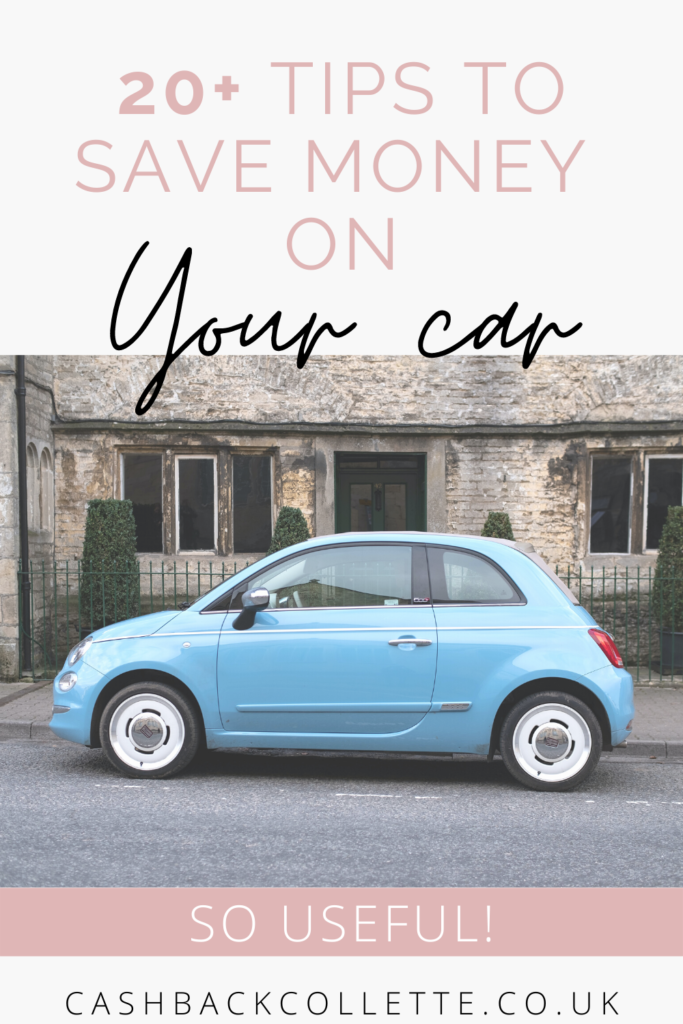Whether you want to save money to save for a house, or you have other big financial goals, you might want to consider how you can save money with your car.

Saving money on transportation doesn’t mean that you walk everywhere, or only take bus rides or carpool with friends. In fact, you may end up saving more money and time by operating your own car rather than relying on public transportation.
If you’re looking to save money while still driving your own car, or potentially purchasing a new vehicle, here are some of my best cost-saving tips!
- Opt for credit cards that offer cashback on fuel purchases. Some credit cards will offer up to 5% on fuel purchases. Just make sure you’re paying the full balance of your credit card monthly so you don’t fall into the pit of high-interest credit card rates since that fully defeats the purpose.
- Purchase long-lasting high-quality tyres. Don’t go for the cheapest tyre available, since that will be expensive in the long run. Aim for ones that have an ‘A’ rating since this will help your fuel economy.
- On a similar note, keep your tyres at their correct pressure. By monitoring your tyres, you’ll be quick to notice a leak that could result in a blown tyre, and you’ll also be impacting your fuel economy.
- Don’t put the pedal to the metal. This might be a no-brainer, but the faster your car is going, the more fuel is required. To reduce how often you’re filling up your tank, and to reduce wear and tear, opt to drive your car a little slower than you might want.
- If you’re looking to purchase a car, look into vehicle finance options outside of a dealership, since they typically have higher interest rates.
- Negotiate your car insurance. Typically car insurance agents can offer reduced deals if you simply inquire. Consider the price a starting point, and discuss options on how to reduce the cost without reducing your coverage. (This might mean paying a year in advance, for a price break example.)
- If you haven’t purchased a vehicle yet, contact various car insurance agencies to see what types of cars lead to slightly less expensive insurance.
- If you’re concerned with exorbitant parking prices, download an app that helps you find cheap and available parking spaces in your area, such as AppyParking or JustPark.
- Don’t carry extra weight in your vehicle if possible. Instead of toting your entire home around with you, lighten your load to improve your fuel economy.
- Got a dirty car? Forego the professional car wash. Choose to hand wash your own car, and save a few bucks, and get a bit of a workout while you’re at it!
- New to the car world? If you’re looking to buy a car for the first time, consider going with a very small model. Smaller cars typically are cheaper than their larger counterparts. In addition, they are easy to find parking for and have better fuel economy.
- Don’t skip maintenance. Preventative maintenance is a huge cost-saver. It can feel expensive to have your oil changed every so many miles or take it up for a tune-up every year. However, that annual maintenance more than pays for itself. The first time you need a tow truck or have to call for an uber last minute because your car is on the brinks, you’ll realise how expensive it is to not perform preventative maintenance. Are there things you just can’t totally predict? Sure. There will be times that your car might have issues you couldn’t have prevented, but those are few and far between if you are staying up to date with regular maintenance.
- Learn how to do basic maintenance on your car, such as checking your car’s air filter each month. When a vehicle has a dirty filter, the engine of your car is negatively affected and your fuel mileage will also be impacted. An air filter is relatively inexpensive and is an easy way to lengthen the life of your engine. If you don’t want to completely replace it, just blow it out with air. Voila.
- Shop around. If you are in the market for a specific car but don’t have a deadline, spend a little extra time finding the right car for the right deal. Don’t immediately settle for the first one you find.
- If you have a vehicle and struggle with the payments, it’s time to downgrade.
- By trading your car into a dealership, you can put the car towards your next vehicle, which can be convenient. However, selling it as a private party will get you substantially more. Weigh how valuable your time is before deciding how you want to sell or trade in your existing car.
- When having maintenance done on your vehicle, skip the dealership unless it is still under warranty. A private mechanic will provide better deals than a dealership.
- Think aerodynamically. If you’re really trying to save fuel, roll up those windows and take down any luggage or bike rack on your car, which can cause further wind resistance. Your car will have to work ever-so-slightly harder by working against wind resistance, which means less fuel economy for you.
- Using the right oil will lengthen the life of your engine. If you’re not sure which type of motor oil you should be using, check with your owner’s manual.
- Plan your route and avoid high-traffic hours. If you can skip driving during rush hour by leaving your house earlier or staying a few minutes later at work, you’ll be able to skip the stop-and-go which guzzles fuel down. Stop and go traffic is also incredibly hard on your motor. Choose a route that reduces multiple stops.
- When your check engine light pops on, don’t ignore it. While your car is not likely to just stop operating suddenly, the check engine light is there for a reason. Usually, a check engine light is signaling that a sensor is no longer functioning correctly. When that happens, your vehicle may operate as though it needs more fuel, which will cause it to run rich. By ignoring a check engine light, you’re flushing money down the drain, especially since many sensors are easily replaced.
- Don’t assume your vehicle needs an oil change every 3,000 miles. Up until recently, mechanics suggested that all cars need their oil changed every 3,000 miles, or 3 months, whichever came first. However, cars have become a lot more efficient and rarely need to have oil changes so often. Check with your user manual. Some car manufacturers state that every 10,000 miles is plenty often.
- Rotate your tyres. By rotating your tyres, you are ensuring your wheels are balanced, saving you from replacing your tyres as often. This also help maximize the length of each of your tyres.
Whether you’re new to being frugal or have spent years trying to save money, you can still have a car to get you around town and take you on road trips without sacrificing your money-saving ways. To save substantially, you can also opt to conduct a lot of maintenance yourself, especially basic maintenance like oil changes.
By making smart decisions, you can ensure that you’ll have a reliable car without a huge monthly payment.
Happy Driving!
Pin for later…

This is a collaborative post
